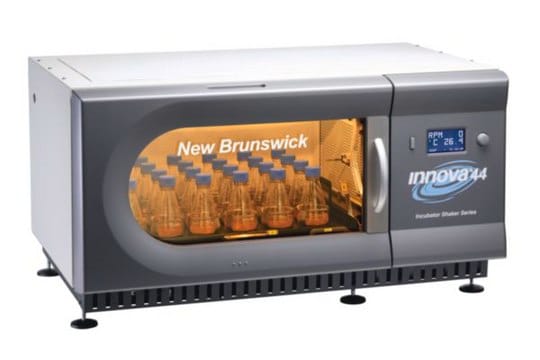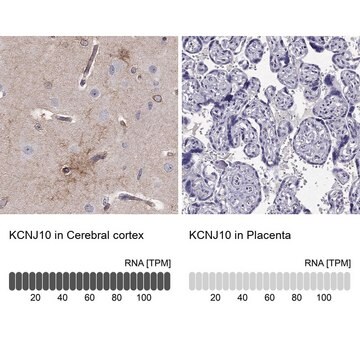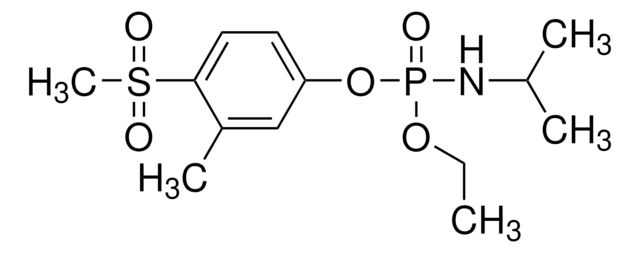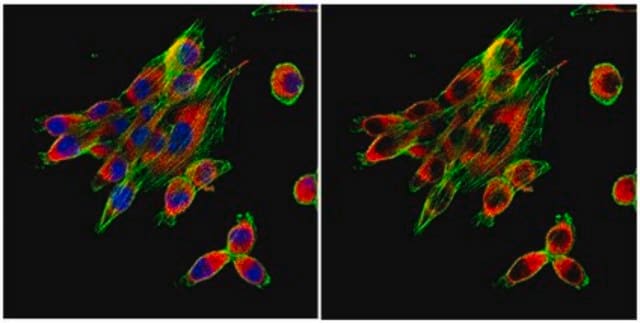HCCB4MAG-58K
MILLIPLEX® Human Circulating Cancer Biomarker Magnetic Bead Panel 4 - Cancer Multiplex Assay
About This Item
Recommended Products
species reactivity
human
Quality Level
manufacturer/tradename
Milliplex®
assay range
accuracy: 80-110%
standard curve range: 0.1-100 ng/mL
(L1CAM)
standard curve range: 0.1-100 ng/mL
(Mesothelin)
standard curve range: 0.3-250 ng/mL
(Hepsin)
standard curve range: 1.4-1,000 ng/mL
(CD44)
standard curve range: 1.4-1,000 ng/mL
(Transglutaminase 2 (TGM2))
standard curve range: 13.7-10,000 pg/mL
(EpCAM)
standard curve range: 13.7-10,000 pg/mL
(Midkine)
standard curve range: 2.7-2,000 ng/mL
(ALDH1A1)
standard curve range: 20.6-15,000 pg/mL
(Carbonic Anhydrase IX (CA9))
standard curve range: 27.4-20,000 pg/mL
(Kallekrein-6)
inter-assay cv: <10%
intra-assay cv: <20%
technique(s)
multiplexing: suitable
detection method
fluorometric (Luminex xMAP)
shipped in
wet ice
General description
MILLIPLEX® Human Circulating Cancer Biomarker Panel 4 is a 10-plex kit to be used for the simultaneous quantification of any or all of the following analytes in serum and plasma samples: Aldheyde dehydrogenase 1 Family, Member A1 (ALDH1A1), Carbonic Anhydrase IX (CA9), CD44, Epithelial cell adhesion molecule (EpCAM), Hepsin, Kallikrein-6, Mesothelin, Midkine, Neural cell adhesion Molecule L1 (L1CAM), and Transglutaminase 2 (TGM2). This kit uses a 96-well format, contains a lyophilized standard cocktail, two internal assay quality controls and can measure up to 38 samples in duplicate.
The Luminex® xMAP® platform uses a magnetic bead immunoassay format for ideal speed and sensitivity to quantitate multiple analytes simultaneously, dramatically improving productivity while conserving valuable sample volume.
Panel Type: Circulating Cancer
Application
- Analytes: Aldheyde dehydrogenase 1 Family, Member A1 (ALDH1A1), Carbonic Anhydrase IX (CA9), CD44, Epithelial cell adhesion molecule (EpCAM), Hepsin, Kallikrein-6, Mesothelin, Midkine, Neural cell adhesion Molecule L1 (L1CAM), Transglutaminase 2 (TGM2)
- Recommended Sample Type: Human serum, plasma or tissue/cell/tumor culture supernatant
- Recommended Sample Dilution: 25 μL per well of 1:5 diluted serum or plasma can be used. Tissue culture supernatant may require a dilution with an appropriate control medium prior to assay
- Assay Run Time: Overnight (16-18 hours) at 2-8°C
- NOTE: min DC for CA9, Midkine, Kallikrein 6 and EpCAM are in pg/mL while the rest of the analyte min DC are in ng/mL
- Research Category: Cancer
- Research Subcategory: Immune Response, Alzheimer′s Disease, Inflammation, Oncology, Tumor Markers
Features and Benefits
Other Notes
Legal Information
Signal Word
Danger
Hazard Statements
Precautionary Statements
Hazard Classifications
Acute Tox. 3 Dermal - Acute Tox. 4 Inhalation - Acute Tox. 4 Oral - Aquatic Chronic 2 - Eye Dam. 1 - Skin Sens. 1 - STOT RE 2
Target Organs
Respiratory Tract
Storage Class Code
6.1D - Non-combustible acute toxic Cat.3 / toxic hazardous materials or hazardous materials causing chronic effects
Flash Point(F)
Not applicable
Flash Point(C)
Not applicable
Certificates of Analysis (COA)
Search for Certificates of Analysis (COA) by entering the products Lot/Batch Number. Lot and Batch Numbers can be found on a product’s label following the words ‘Lot’ or ‘Batch’.
Already Own This Product?
Find documentation for the products that you have recently purchased in the Document Library.
Related Content
Detection of cancer biomarkers through multiplex cancer assays can accelerate studies of normal homeostasis and tumorigenic processes. See how MILLIPLEX® multiplex cancer assays are advancing various cancer research areas including lung cancer, breast cancer, and immuno-oncology research.
Detection of cancer biomarkers through multiplex cancer assays can accelerate studies of normal homeostasis and tumorigenic processes. See how MILLIPLEX® multiplex cancer assays are advancing various cancer research areas including lung cancer, breast cancer, and immuno-oncology research.
Detection of cancer biomarkers through multiplex cancer assays can accelerate studies of normal homeostasis and tumorigenic processes. See how MILLIPLEX® multiplex cancer assays are advancing various cancer research areas including lung cancer, breast cancer, and immuno-oncology research.
Detection of cancer biomarkers through multiplex cancer assays can accelerate studies of normal homeostasis and tumorigenic processes. See how MILLIPLEX® multiplex cancer assays are advancing various cancer research areas including lung cancer, breast cancer, and immuno-oncology research.
Our team of scientists has experience in all areas of research including Life Science, Material Science, Chemical Synthesis, Chromatography, Analytical and many others.
Contact Technical Service












